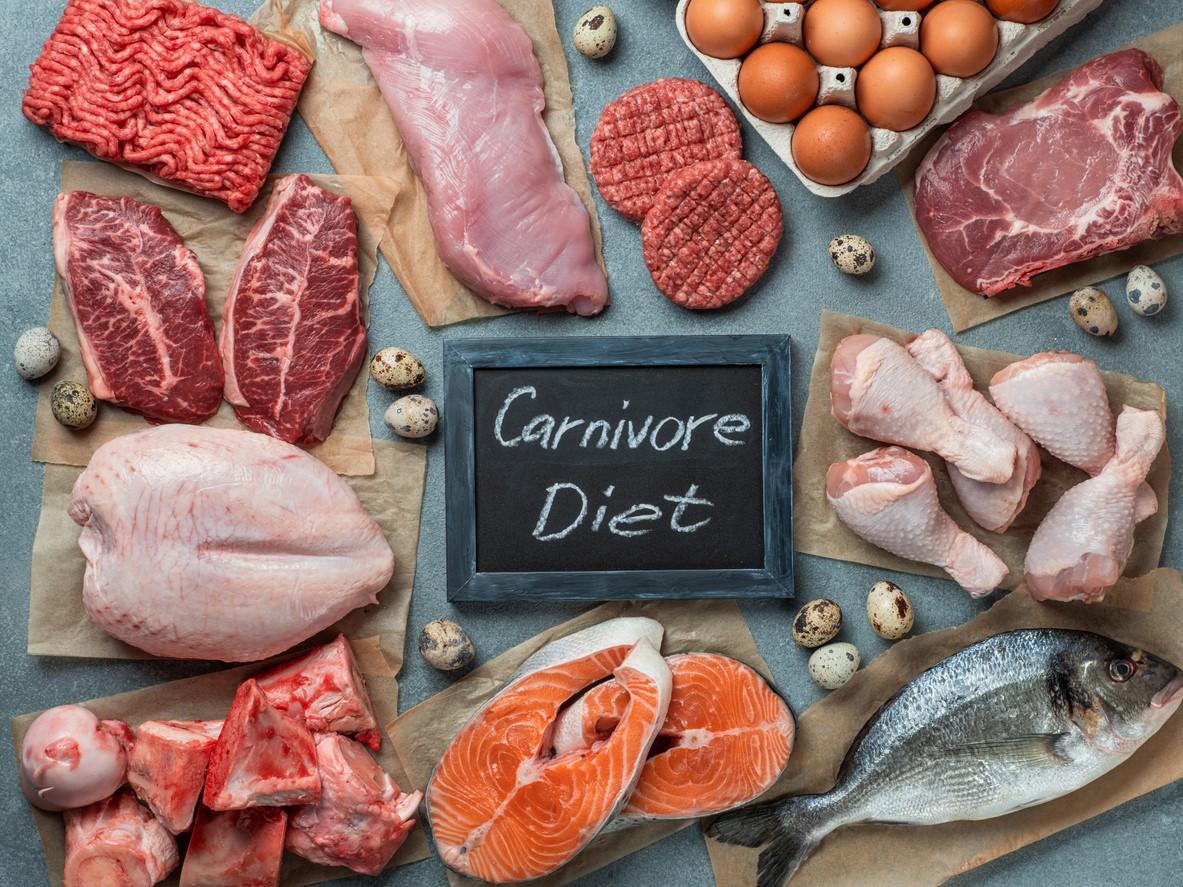
What is the carnivore diet and is it healthy?
Peer reviewed by Dr Krishna Vakharia, MRCGPLast updated by Amberley DavisLast updated 11 May 2023
Meets Patient’s editorial guidelines
- DownloadDownload
- Share
- Language
- Discussion
The #carnivorediet tag has gained more than 900 million views on TikTok. Far from your average high-protein low-carb diet, on the carnivore diet you eat meat, and meat alone. If this sounds questionable for your health and contrary to mainstream nutritional advice, that's because it is.
In this article:
Continue reading below
What is the carnivore diet?
When it comes to nutrition, the carnivore diet breaks all the rules. It's been popularised by Shawn Baker, MD, in his 2019 book The Carnivore Diet. Despite the lack of scientific evidence, this extreme elimination diet is trending on TikTok, the video-sharing platform popular among Generation-Z and Millennials.
Ro Huntriss is a leading dietitian and founder of Dietitian Ro and Fertility Dietitian. She says: "The carnivore diet is a dietary approach that involves eating only animal-based foods, such as meat, fish, and eggs, and excluding all plant-based foods such as grains, fruits, and vegetables."
In the purest form of the diet, you eat only meat and drink only water. The chances are that immediately cutting out all other food groups will seriously upset your stomach and cause other immediate health problem. For this reason, Baker and other carnivore diet proponents advise gradually reducing your intake of other foods over several weeks1.
Is the carnivore diet healthy?
In his book, Baker claims that this way of eating can lead to significant health benefits, including weight loss, improved digestion, and better athletic performance. However, critics have raised concerns around the lack of scientific evidence supporting these claims and the potential risks of following such a restrictive diet.
Huntriss says: "The potential benefits and risks of the carnivore diet are not yet fully understood and remain a topic of debate. While it can provide some essential nutrients such as protein, iron, and vitamin B12, it may lack other nutrients mainly found in plant-based foods like fibre, vitamin C, and folate." Of note, too much red meat and processed meats have been linked to an increased risk of bowel cancer.
This eating plan ignores a lot of strong evidence for consuming a well-balanced, varied, and colourful diet. For example, the Mediterranean diet involves eating lots of fruit and vegetables, whole grains, and legumes and consuming less red meat. As a result, it can reduce your risk of many conditions, including high blood pressure, heart disease, obesity, type 2 diabetes, some cancers, and Alzheimer's disease. In fact, the Mediterranean diet may even be the secret to longer life.
Continue reading below
Shawn Baker's benefits of the carnivore diet
Baker speaks of several carnivore diet health benefits1. For example:
Weight loss.
Diabetes reversal.
Digestive health.
Anti-inflammatory benefits for autoimmune diseases.
The problem is these claims have little grounding in existing scientific research. Instead, much of the evidence is anecdotal - but these so-called success stories should be treated with caution. In one survey, carnivore diet followers report experiencing benefits2, but experts have raised concerns that the study didn't attempt to check the accuracy of this self-reported health information3.
Celebrity endorsement has also overshadowed the lack of robust evidence. When famous psychologist Jordan Peterson stated that living on beef, salt, and water improved his and his daughter's anxiety, depression, psoriasis, gastric reflux, and rheumatoid arthritis, the news spread that the carnivore diet was anti-inflammatory. In fact, when it comes to anti-inflammatory diets that help fight or improve illness and disease, the science points towards colourful, plant-based eating.
It's also worth noting here that not all anecdotal carnivore diet stories have been positive. Musician James Blunt developed scurvy six to eight weeks into the carnivore diet4. This illness occurs when you don't get enough vitamin C, which can lead to a whole host of dangerous and uncomfortable symptoms.
Can you lose weight on the carnivore diet?
At its core, this diet is an extreme type of elimination diet that champions protein above all other food groups. It's possible to lose weight on this diet because there's no snacking, and because protein helps you feel fuller for longer, which could help reduce your calorie intake.
However, studies show that it's hard to sustain any weight loss achieved through restrictive dieting for a long period of time. If you restrict your calories too much, not only are you unlikely to keep this deficit for long, but once you stop you could gain more weight than you previously had5.
The zero-carb, all-protein policy of the carnivore diet also over-simplifies the role of both food groups in healthy weight control. Ketosis - a state where your body loses weight by burning fat rather than carbs - can also be hindered by having too much protein. It's also worth remembering that many meats are also higher in fat and calories, gram for gram, than many healthy carbs.
Risks and downsides of the carnivore diet
The carnivore diet is imbalanced and low in several essential nutrients that keep your body healthy and working properly. This can lead to health problems in the long-term. For example, this meal plan lacks sufficient intake of:
Vitamin C - needed for the repair and health of tissues throughout your body.
Vitamin E - needed for a healthy immune system, disease protection, and healthy circulation.
Fibre - needed for energy, heart health, and reduced risk of cancer and type 2 diabetes.
Folate - needed to make new cells and to prevent anaemia.
"If you do choose to follow this diet, you should certainly consider nutrition supplements to fill in any nutrient gaps," says Huntriss. But bear in mind that supplements are nowhere near as effective at providing your body with what it needs.
While meat supplies certain nutrients, a meat-only diet - especially one that focusses on red meats like beef and pork - is typically high in saturated fats. According to Huntriss, this may increase your risk of certain health issues, such as cardiovascular disease and stroke.
She goes on to warn of the additional safety issues associated with the carnivore diet for people with:
Chronic kidney disease - people with this are often advised to avoid a high-protein diets.
Gout - a high meat intake can make symptoms of gout worse.
Pregnant and breastfeeding women - a lack of essential nutrients can negatively affect your baby's development.
What can you eat on the carnivore diet?
Meat-eating is the name of the game with the carnivore diet. There are some rules within this, including focussing on high animal fat content to ensure you get enough calories.
Foods to eat
Focus on red meats - pork, beef, and lamb.
Organ meats.
White meats - chicken and fish.
Bone broth and marrow.
Non-dairy animal products - butter, lard, eggs.
Sauces made wholly from the above animal products - no added flour.
Salt and pepper.
Water.
Foods to avoid
Highly processed meats - for example, bacon and pepperoni, contain lots of preservatives and salt. Too much salt can cause high blood pressure, kidney problems, and other health issues.
Dairy products - for example, milk, cheese, yoghurt. These contain carbs and often other food groups banned on this diet.
Fruit and vegetables.
Legumes, nuts, seeds.
Carb-containing foods - for example, pasta, rice, bread, grains.
All drinks except water.
Continue reading below
How is the carnivore diet different to keto?
The carnivore diet shares some similarities with the ketogenic (keto) diet - but it can be seen as more extreme and restricting. Huntriss explains:
"The keto diet is a high-fat, low-carb dietary approach that aims to get the body into a state of ketosis. It encourages the consumption of high-fat foods and moderate amounts of protein, while limiting carbs to about 20-50 grams per day."
The dietitian explains that the main difference between the two diets is that the carnivore diet allows only animal-based foods, whereas the keto diet allows some low-carb plant-based foods, such as non-starchy vegetables, nuts, and seeds.
"Although both diets are restrictive in their own ways, keto allows vegetables and some fruit, in addition to the animal products found in the carnivore diet. Ultimately, this means that the nutrient diversity from the keto diet can be greater than what is found in the carnivore diet."
If you're considering the carnivore diet, Huntriss shares this final piece of advice: "The long-term effects of the carnivore diet are not well studied. Based upon what we know currently, most health and nutrition professionals would not recommend this diet.
"Shawn Baker's book provides just one perspective on the carnivore diet. It is important to consult with a healthcare professional and evaluate the available scientific evidence before implementing this way of eating into your lifestyle."
Further reading
Patient picks for Diet

Diet and nutrition
How to make small healthy changes to your diet without dieting
While fad diets might lead to fast and dramatic weight loss, they're often unsustainable in the long term. Instead, it's healthier to make small, healthy changes to the way you eat to create positive, long-lasting habits.
by Lynn Stephen

Diet and nutrition
What is the Korean diet?
The Korean Diet - often called the K-diet - is rooted in the traditional foods commonly enjoyed in Korea. With the global rise in Korean culture’s popularity, interest in the K-Diet has surged, largely due to its apparent health benefits. We look at what the K-Diet involves, and whether it's good for you.
by Victoria Raw
Continue reading below
Article history
The information on this page is peer reviewed by qualified clinicians.
11 May 2023 | Latest version
11 May 2023 | Originally published

Ask, share, connect.
Browse discussions, ask questions, and share experiences across hundreds of health topics.

Feeling unwell?
Assess your symptoms online for free
Sign up to the Patient newsletter
Your weekly dose of clear, trustworthy health advice - written to help you feel informed, confident and in control.
By subscribing you accept our Privacy Policy. You can unsubscribe at any time. We never sell your data.